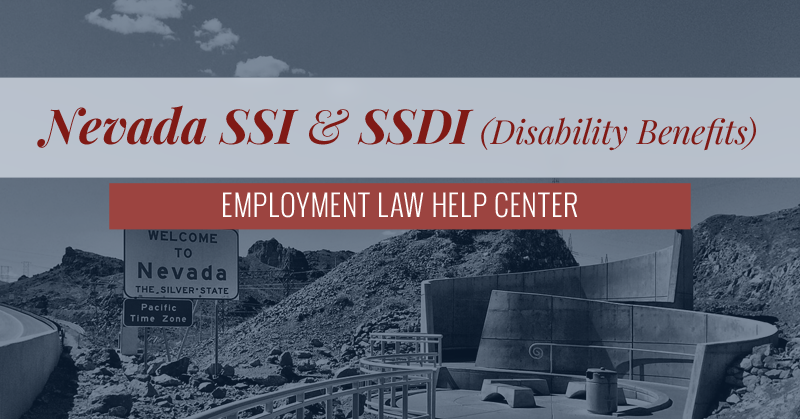Nevada SSI/SSDI Benefits
If you live in Nevada and suffer from a disability that prevents you from working, there are two federal programs in place that provide financial assistance: Supplemental Security Income (SSI), for those whose income falls below a certain level, and Social Security Disability Insurance (SSDI), for those who have worked in the past and paid into the Social Security system. Unfortunately, even disabled individuals who have a legitimate claim for SSI or SSDI benefits may have their claim denied by the Social Security Administration, and statistics show that only 32% of disability claims in Nevada are approved during the initial application process. Contact an experienced SSI/SSDI attorney today if you believe you may qualify for disability benefits in Nevada, or if your claim for benefits has been denied.

Supplemental Security Income
Supplemental Security Income (SSI) is a federally-funded benefits program that makes monthly cash payments to individuals who are disabled, blind, or age 65 or older, and have limited income and resources. In order to qualify for SSI benefits, the value of the things you own must be less than $2,000 for individuals, or less than $3,000 for married couples living together, not including the value of your home if you live in it, or, in most cases, the value of your car. Generally, the maximum federal SSI benefit changes yearly, based on increases in the Consumer Price Index. Individuals who are approved for SSI benefits are also automatically eligible for Medicaid from the state of Nevada, and may also qualify for help through the SNAP program, formerly known as food stamps.

Social Security Disability Insurance
Social Security Disability Insurance (SSDI) is another federally-funded program that provides monthly benefits to individuals who become disabled before reaching retirement age, and are unable to work. The main difference between SSDI and SSI is that SSDI benefits are only paid to those who have worked a certain number of years and paid Social Security (FICA) taxes, thereby earning “work credits” at a rate of four per year. The number of work credits you need to qualify for SSDI benefits depends on how old you were when you became disabled. For example, if you were 50 years old when you became disabled, you would need 28 work credits, or to have worked for seven years, to qualify for SSDI, and at least five of those years must have been within the last ten years.
Nevada
The state of Nevada pays an optional state supplement to all recipients of SSI benefits who are elderly or blind, and these two payments come directly from the Social Security Administration as one combined check. This state supplement is not available to a disabled person in Nevada unless he or she is part of an eligible couple with an aged or blind partner, or if he or she resides in a facility where medical assistance covers more than 50% of his or her care. As of 2016, the maximum benefit amount for SSI recipients in Nevada, including federal and state payment amounts, is $769.40 (aged) or $842.30 (blind) for an individual living on his own, $512.94 (aged) or $702.63 (blind) for an individual living in someone else’s home, and $1,124 (aged) or $1,124 (blind) for an individual living in a medical institution.
An Experienced Nevada Disability Attorney Can Help
While many of the processes for applying for, being approved for, or appealing a denied Supplemental Security Income or Social Security Disability Insurance claim are standardized throughout the country, there are some factors that vary state by state, including the amount of the monthly payment, how decisions are made, the proof you need to support your disability claim, and the percentage of claims that are approved and denied. If you are suffering from a physical or mental disability that prevents you from working in Nevada, you may qualify for monthly SSI or SSDI payments. Consult a knowledgeable Nevada disability attorney today to discuss your eligibility.




